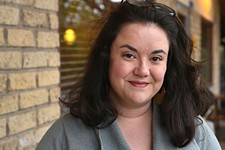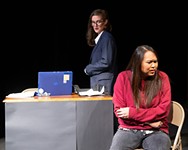33 Variations
The script and cast keep this drama of Beethoven and a modern scholar a human story
Reviewed by Elizabeth Cobbe, Fri., Feb. 8, 2013

33 Variations
Zach Topfer Theatre, 202 S. Lamar, 476-0541www.zachtheatre.org
Through Feb. 17
Running time: 2 hr., 30 min.
Genius and obsession: They're not that much fun to live with, but they make great inspiration for a play. In Moisés Kaufman's 33 Variations, we see the final years of Beethoven (Peter Reznikoff) as he ekes out his Diabelli Variations. Mirroring his journey and his decline is Dr. Katherine Brandt (Beth Broderick), a musicologist who struggles to finish her academic study of the Variations while warding off the degenerative symptoms of Lou Gehrig's Disease. Surrounding them both are friends and family who try to keep pace with these geniuses while providing what care they can.
Brandt has a theory about the Diabelli Variations: that Beethoven, who was originally invited to compose just one variation on a waltz by music publisher Anton Diabelli (Brian Coughlin), created 33 as a means of mocking poor Diabelli's mediocre effort. Despite her disease, Brandt leaves New York for Germany, where she immerses herself in Beethoven's original manuscripts, journals, and letters at a library run by a stern scholar (Barbara Chisholm). (Note: Chisholm is married to Chronicle Arts Editor Robert Faires.)
Kaufman's play operates in a mode of variations, just like the music. Relationships and choices are echoed across the years – deaf Beethoven tortures his faithful assistant (Greg Baglia) with his irascible stubbornness, increasingly debilitated Brandt pushes away her daughter Clara (Christin Sawyer Davis) when she tries to care for her mother – but they are interpreted, not repeated. Director Dave Steakley leads his cast through a careful series of movements, coordinating performances and stories into one whole composition. The production is helped by Cliff Simon's versatile set design, which combines the archival stacks of an academic library with the horizontal lines of a music staff.
Notable especially for followers of classical music is the performance of pianist Anton Nel, who plays parts of the Diabelli Variations onstage, in and around the action of the play. The music engages in a figurative dialogue with the story, delivering a unique understanding of events. To a theatregoer, Nel's performance is excellent.
As cerebral as subject matter like music theory and history can be, it's to the credit of Kaufman and Zach's cast that the play remains a human story of accepting personal tragedy as a part of life's music. When Clara's efforts to connect with her mother are rebuffed over and over, her boyfriend (Lincoln Thompson) tells her that these times might be all she gets. Not every family has the final understanding they might long for; it's about accepting what you have, rather than spending precious time longing for the impossible.
As her life draws to a close, Brandt discovers, through her daughter, new possibilities for Beethoven's motivations in creating the grand composition. To describe them here would be to rob future audiences of the pleasure of watching Brandt gain those understandings, but there is a reassurance in Kaufman's suggestion for what Beethoven might have been thinking. Life contains plenty of sadness, but it's also possible that the simplest of loves can give rise to great beauty.












